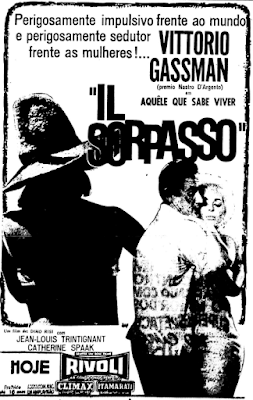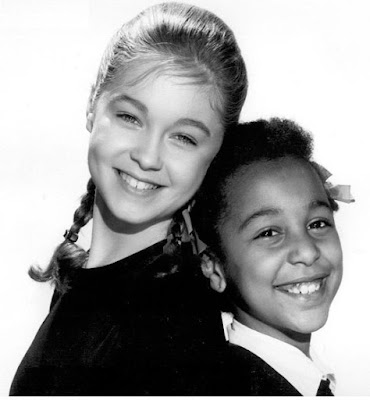10 October 1964 - United Artists' 2nd James Bond movie opens at Cine Windsor; unlike its predecessor 'Dr No', which was barely noticed by the press (and public) 'From Russia with love' or 'Moscou contra 007' as it was known in Brazil; on the right: EMI-Odeon's single 'From Russia with love' sung magnificently by Matt Monro which went up the Brazilian charts.
17 October 1964 - 'O Estado de S.Paulo' movie columnist writes a thorough review about 'From Russia with love' (Moscou conta 007) which opened at Cine Windsor a week before.
17 October 1964 - Dino Risi's 'Il sorpasso' ('A ultrapassagem' would be the right translation but 'Aquele que sabe viver' was the title chosen by the Brazilian distributor) which opened in Italy on 6 December 1962 and in the USA one year later 22nd December 1963, opens in São Paulo almost two years too late.
20 December 1964 - Condor Filmes presents 'Marisol no Rio' (Rumbo a Rio) in which the Spanish child-star just turned 15 years-old plays a double role (twin sisters Marisol and Mariluz separated early in life) obviously reminiscent of Hayley Mills who had done the same trick in Walt Disney's 'Parent trap' only 2 years earlier (1961).
any similarity between 1961's 'Parent trap!' and 1963's 'Marisol rumbo a Rio' is not coincidence.
The highlight of 'Marisol no Rio' is when sisters Marisol and Mariluz fall off the cliff of Corcovado mountain. Copito looks on helplessly.
Joëlle Rivero, who was born in Malabo, Equatorial Guinea and Marisol.
18 December 1964 - While 'Marisol no Rio' opens at cinemas in Sao Paulo, Brigitte Bardot arrives in Rio and is welcomed by Vera Lucia Couto, Miss Brazil 1964.
20 December 1964 - Brazilian movie industry was not bad at all at the end of 1964: major productions like Oswaldo Massaini's 'Lampião, rei do cangaço', Walter Hugo Kohuri's 'Noite vazia' and independent producer José Mojica Marins's 'A meia-noite levarei sua alma' competed with Hollywood productions like Samuel Bronston's 'The fall of the Roman Empire' and Michael Anderson's 'Flight from Aghiya' (Sacrificio sem gloria).
19 December 1964 - Actress-impresario-theatre-owner Ruth Escobar presents Brecht's 'Opera dos 3 vinténs' ('Die Dreigroschenoper' or 'The 3 penny opera') with power-house singer Leny Eversong supported by Ruth Escobar herself, Luely Figueiró and Nilda Maria.
19 December 1964 - Look at the line up at Teatro Maria Della Costa Bossa Nova show: Vinicius, Agostinho, Raul Cortez, Manfred Fest Trio, Taiguara, Toquinho etc.; Sergio Cardoso does a Shakespeare recital at Teatro de Arte Israelita Brasileiro for subscribers of Instituto Cultural Israelita Brasileiro; English singer Dusty Springfield is expelled from South Africa by racist-government.
19 December 1964 - Mary Wynne pokes fun at Egas Muniz (a columnist from another rag) for having posted a photo of a '3rd-page-voloptuous-woman' she desapproved. Mary was friendly with a lot of people, including Mauricio Kus who worked as Braniff's public-relations-officer.
Enquanto a cidade inteira está tentando resolver o problema de escolher entre os reveillons deste ano, Mauricio Kus achou uma solução bem feliz. Até foi bem fácil para ele, o 'globe-trotter public-relations' da Braniff, ter a bela ideia de dar um pulinho a jato para passar o fim de ano em (sic) Panamá. Na foto de hoje, Maurico com seu companheiro de viagem. sr. Sylvio Paula Ramos, que é também 'public relations' da H.Stern, durante aquele maravilhoso voo de 12 minutos entre Congonhas e Viracopos na semana passada.
27 December 1964 - It is amazing to note that Spanish-speaking films were still very popular in Brazil as late as 1964. Sarita Montiel was a definite movie-queen and her flicks were desperately sought after by eager fans who would stand on queues for hours. 'La Bella Lola' was shot in 1962, a period Sarita was still very much on demand; Cantinflas' 'El señor fotografo' (O grande fotografo) was first released in 1953 so it was 11 years old already but still successful; Samuel Bronston's 'The fall of the Roman Empire' (A queda do Império Romano) with an stellar cast headed by Sophia Loren and Stephen Boyd was in its 5th week at Cine Rio Branco.





.PNG)
.PNG)























































